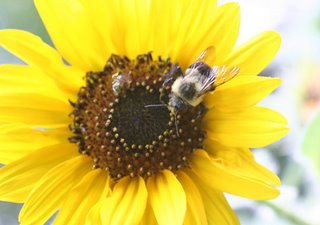
Randolph E. Schmid, Associated Press
This is a story about the birds and the bees and reproduction. No, not that story. It's about plants. Most plants need to be pollinated by birds, bees, bats and other animals and insects to reproduce. And scientists say a decline in pollinators may spell trouble for crops.
Honeybees and bumblebees have been infected by the introduction of a parasite, while destruction of cave roosts has led to a decline in the bat population, according to a report released Wednesday by the National Research Council.
Other pollinator declines may also be associated with habitat loss but more research is needed to make sure, according to the council, an arm of the National Academy of Sciences.
More detailed research has been done in Europe, where declines and even extinctions of pollinators have been documented.
The report pointed out that in order to bear fruit, three-quarters of all flowering plants — including most food crops and some that provide fiber, drugs, and fuel — rely on pollinators for fertilization.
Farmers often lease colonies of bees to ensure pollination.
Yet honeybees, which pollinate more than 90 commercially grown crops, are one of the most affected pollinators. Indeed, honeybees had to be imported from outside North America last year for the first time since 1922, the report said.
The report urged the Agriculture Department to increase research into pest management and bee breeding practices.
In addition, long-term studies must be done on the populations of wild bee species and some butterflies, bats and hummingbirds, it said.
The United States should collaborate with Canada and Mexico to form a network of long-term monitoring projects, the council recommended.
Landowners, meanwhile, can take simple steps to make habitats more "pollinator friendly," for instance by growing native plants, the report suggested.
The research was funded by the Department of Agriculture, U.S. Geological Survey, National Academies and the Research Council's Division on Earth and Life Studies.
The study was requested by The North American Pollinator Protection Campaign, representing agencies and organizations in the United States, Canada and Mexico.
Animal Den - Gift Shop for Bird Lovers!
Reference:Discovery
No comments:
Post a Comment